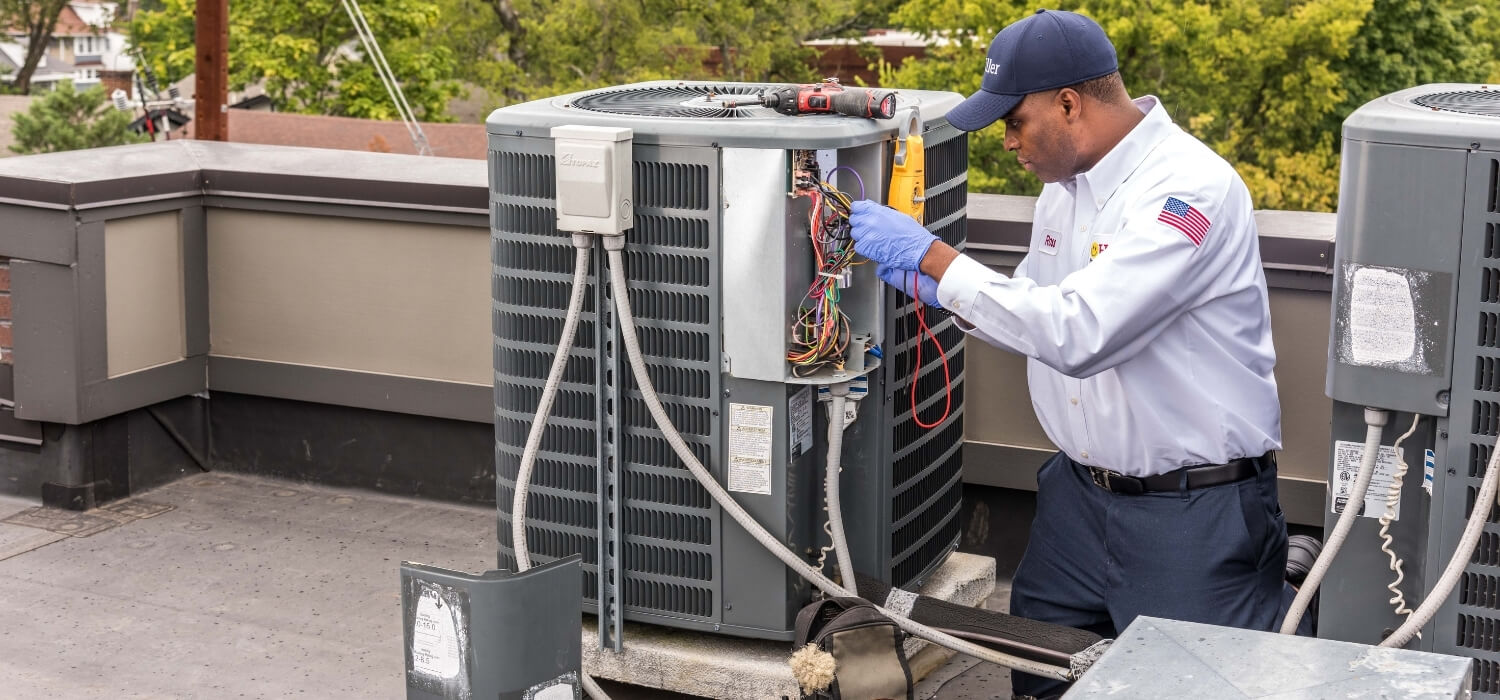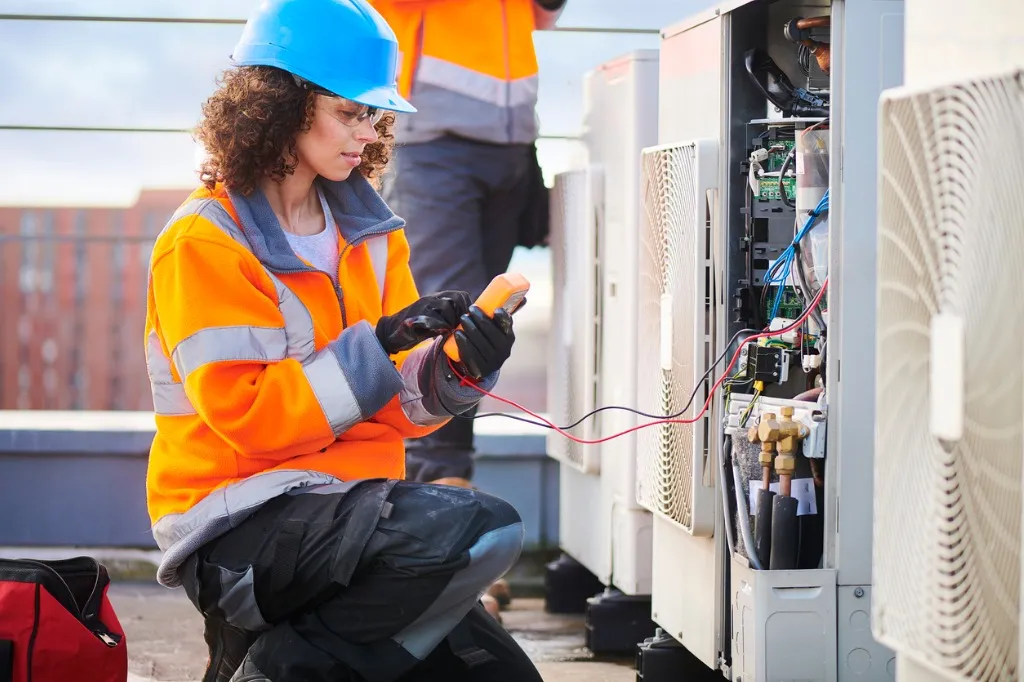A Thorough Consider A/c Providers and Their Effect On Energy Effectiveness and Cost Cost Savings
The function of cooling and heating solutions in boosting power effectiveness and accomplishing cost savings is much more critical than ever before, as organizations and house owners look for sustainable remedies in a significantly eco-conscious world. With technological innovations like clever thermostats and high-efficiency parts, the potential for maximizing system performance is substantial. Yet, the true influence of these innovations depends largely on routine maintenance and positive problem management. As we explore the detailed partnership in between heating and cooling systems and operational costs, including the change towards eco friendly choices, the inquiry occurs: exactly how can these approaches be efficiently carried out to optimize both environmental and economic advantages?

Significance of Cooling And Heating Solutions
heating and cooling systems are a crucial part of modern structures, playing an important role in preserving comfy and healthy interior settings. These systems, encompassing heating, air, and air flow conditioning, are crucial for controling temperature, moisture, and air high quality, therefore making sure the well-being of residents. Efficient a/c systems add dramatically to producing an optimal indoor environment, which is essential for both industrial and household spaces.
In industrial buildings, cooling and heating systems are indispensable to providing a productive and risk-free atmosphere. By managing indoor climate problems, these systems aid prevent the development of mold and the spread of airborne pollutants, hence securing the health and wellness of staff members and consumers. Additionally, in household settings, a/c systems improve living conditions by using constant thermal comfort and improving indoor air high quality, which is important for total health.
In addition, the design and upkeep of heating and cooling systems have a straight influence on energy intake and operational expenses. Effectively developed and kept systems can dramatically lower power usage, causing minimized energy bills and a smaller carbon impact. The efficiency of these systems therefore plays an important role in promoting sustainability and energy conservation within buildings, highlighting their value in the modern-day building landscape.
Advancements in HVAC Modern Technology
Technology in a/c modern technology is reinventing the way structures manage interior environments, introducing a brand-new age of efficiency and control. Recent advancements have actually concentrated on enhancing energy intake while boosting user comfort. One remarkable growth is the integration of wise thermostats, which make use of expert system to find out tenancy patterns and change temperatures appropriately, minimizing unnecessary power use.
Variable Cooling Agent Circulation (VRF) systems represent one more considerable jump forward. These systems enable specific temperature level control in different zones of a structure, boosting convenience and decreasing energy waste. VRF technology is specifically valuable for large business rooms, offering versatility and scalability.
Furthermore, the introduction of Net of Points (IoT) devices has changed cooling and heating systems right into interconnected networks capable of real-time information collection and evaluation. This connectivity enables predictive maintenance, ensuring systems run at peak efficiency and lessening unanticipated downtime.
Furthermore, improvements in materials and layout, such as the usage of high-efficiency coils and compressors, have actually boosted total system performance - Heating Contractor. The adoption of eco-friendly cooling agents also emphasizes the industry's commitment to sustainability
These technical developments are crucial in minimizing functional costs and environmental influence, setting brand-new requirements for developing environment management.
Heating And Cooling Upkeep and Performance
Ensuring optimal efficiency of cooling and heating systems prolongs past technological developments; it also pivots on efficient maintenance methods. Normal maintenance is critical for sustaining performance, decreasing energy consumption, and extending the life span of HVAC systems. The key goal is to ensure that all parts work at their peak possibility, thus reducing power waste and preserving regular interior comfort degrees.
Regular maintenance jobs, such as cleaning or replacing air filters, examining refrigerant degrees, and examining ductwork for leakages, are crucial for protecting against unnecessary pressure on the system. Stopped up or unclean filters can block air movement, causing the system to work tougher and click for more info eat more energy. Also, inadequate refrigerant degrees can lower cooling effectiveness, bring about greater operational costs.
Furthermore, routine inspections by qualified professionals can recognize potential problems prior to they rise right into costly fixings or system failings. These evaluations typically consist of examining electric connections, adjusting thermostats, and ensuring the general stability of the cooling and heating system. By resolving minor problems early, property owners and businesses can stay clear of unforeseen breakdowns and improve energy efficiency.
Affordable A/c Solutions
For those wanting to obtain the most out of their ventilation, home heating, and air conditioning systems without damaging the financial institution, checking out affordable HVAC options can make a considerable difference. One instant measure is to buy programmable thermostats, which permit users to set specific temperatures for various times of the day, optimizing energy usage and reducing unneeded usage. By automating temperature level modifications, Read Full Article home owners can accomplish significant savings on power costs.
Routine maintenance is another crucial element of cost-effective heating and cooling administration. Making sure that filters are cleaned or changed regularly, ductwork is secured, and devices are serviced by professionals can stop expensive repair work and improve system durability. Preventive maintenance not only preserves system efficiency yet also helps in preventing unexpected break downs that can bring about costly emergency situation repair work.
In addition, retrofitting existing systems with energy-efficient components, such as variable rate motors or high-efficiency compressors, can be a sensible investment. These upgrades improve operational effectiveness, minimize power usage, and can frequently be applied at a portion of the price of a full system substitute.
Ecological Impact Reduction
Minimizing the environmental impact of heating and cooling systems is critical in today's pursuit of lasting living. Heating and cooling systems are substantial factors to power intake, accounting for almost 40% of power use in industrial buildings. This power need usually relies upon fossil fuels, bring about greenhouse gas discharges and ecological degradation. Transitioning to more effective systems, such as those utilizing renewable resource sources, can considerably mitigate these impacts.
Technological advancements in cooling and heating style and procedure, including the assimilation of wise thermostats and energy-efficient warmth pumps, are critical in lowering carbon impacts. These developments enable enhanced energy use, reducing wastefulness and improving overall system efficiency. In addition, taking on regular maintenance methods ensures a/c systems operate at peak efficiency, additional curtailing unneeded power intake.
Additionally, the use of eco-friendly refrigerants is essential, as traditional cooling agents, like CFCs and HCFCs, have been terminated as a result of their heating contractor ozone-depleting residential or commercial properties. Modern options, such as hydrofluoroolefins (HFOs), deal minimized ecological threats, aligning with international environmental protocols. By embracing these sustainable methods, a/c solutions can play a transformative function in minimizing environmental impacts, advertising energy performance, and fostering a much more lasting future.
Conclusion

In addition, the style and maintenance of HVAC systems have a straight influence on power usage and operational expenses. Regular upkeep is important for maintaining efficiency, minimizing energy usage, and extending the life period of A/c systems. HVAC systems are considerable contributors to power intake, accounting for nearly 40% of energy use in commercial structures. Additionally, embracing regular upkeep techniques makes sure HVAC systems operate at peak effectiveness, further reducing unneeded energy intake.
The change to environmentally friendly Cooling and heating systems further advertises and minimizes operational expenses sustainability. (Heating Contractor)